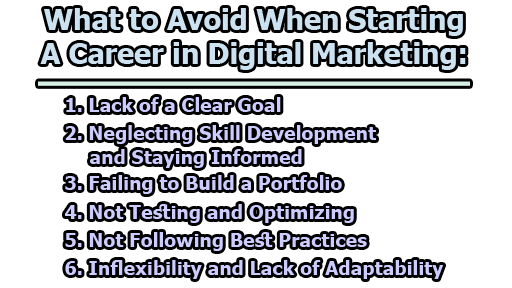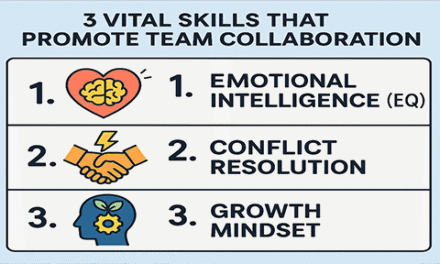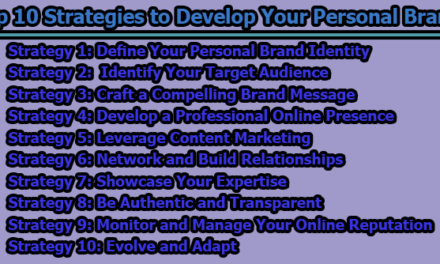What to Avoid When Starting a Career in Digital Marketing:
Digital marketing is an exciting and dynamic field, brimming with opportunities for creativity, innovation, and professional growth. However, it’s not without its challenges and potential pitfalls that can hinder your career if you’re not vigilant. In this article, we will explore what to avoid when starting a career in digital marketing, and how to surmount these obstacles effectively.
1. Lack of a Clear Goal: Embarking on a career in digital marketing without a clearly defined goal is akin to setting sail without a destination. Digital marketing encompasses a plethora of disciplines, including SEO, PPC, social media, content marketing, email campaigns, and more. Each of these areas demands unique skills, strategies, and tools, making it impossible to master all of them simultaneously. Therefore, it is imperative to chart a specific focus and direction for your career and ensure that your actions align with your desired outcomes.
Setting clear, measurable goals is the first step. For example, aim for objectives like acquiring two clients within six months or increasing website traffic by 30% in one year. Specific goals make it easier to monitor progress. Additionally, identify the skills and knowledge necessary to attain these goals and create a plan for acquiring them through courses, certifications, and hands-on practice. Finally, establish metrics for success, whether it’s the number of clients, traffic growth, conversions, or other relevant key performance indicators. Regularly review these metrics to ensure you are on the right track.
2. Neglecting Skill Development and Staying Informed: The digital marketing landscape is ever-evolving and fiercely competitive. Neglecting to learn new skills and stay updated with the latest industry trends can quickly render your knowledge obsolete. It is essential to invest in your professional development and actively seek opportunities to learn and grow.
There are numerous resources available for acquiring new skills. Start by engaging with experts in your desired field. Reach out to experienced professionals and schedule time for in-person or virtual discussions to glean insights and advice. Furthermore, there are a plethora of online courses, blogs, books, webinars, and podcasts that can enhance your skill set. The likes of LinkedIn Learning, Google Ads Academy, and YouTube offer invaluable content for expanding your knowledge. Don’t worry about your initial proficiency level; practice and perseverance are key to improvement.
3. Failing to Build a Portfolio: Your portfolio is a tangible representation of your skills and achievements, a powerful tool to showcase your expertise to potential employers and clients. It should encompass samples of your work, such as websites, landing pages, social media posts, blog articles, email campaigns, and more. In addition, include testimonials, case studies, awards, and metrics that substantiate your impact and results.
An effective portfolio helps you stand out in the competitive digital marketing arena and attracts more opportunities to advance your career. It’s a testament to your abilities and credibility, making it essential not to neglect the creation and continuous improvement of your portfolio.
4. Not Testing and Optimizing: A prevalent mistake among digital marketers is neglecting the vital practice of testing and optimizing campaigns and strategies. One-size-fits-all approaches rarely work in digital marketing. What is effective for one business may not yield the same results for another. It is crucial to experiment with various variables, including headlines, images, copy, keywords, audiences, and channels, while continuously measuring performance and effectiveness.
Data analysis is pivotal in this process. Collect and analyze the data and feedback garnered from your campaigns. Identify what is working and what isn’t. Make necessary adjustments and improvements based on your findings and repeat this process until you achieve your goals. Testing and optimization are integral to increasing conversions, return on investment, and customer satisfaction.
5. Not Following Best Practices: Digital marketing is not a lawless frontier; there are rules and standards that govern the industry. It is essential to adhere to these best practices and guidelines to maintain integrity and professionalism. For example, following SEO guidelines from Google and other search engines, adhering to PPC policies on platforms like Google Ads, respecting email marketing regulations such as CAN-SPAM, and practicing social media etiquette on networks like Facebook are all vital.
Failing to follow best practices can lead to penalties, bans, complaints, and damage to your reputation and trust. To build a reputable and lasting career in digital marketing, it is imperative to respect and adhere to industry guidelines.
6. Inflexibility and Lack of Adaptability: Digital marketing is a fluid and evolving field. Failing to adapt to the ever-changing needs and expectations of your audience and the market is a significant pitfall. To thrive in this dynamic environment, you need to remain open to new ideas and approaches and be willing to experiment and innovate.
Flexibility and adaptability are vital traits in digital marketing. You must be responsive and proactive, anticipating and resolving challenges as they arise. A customer-centric and empathetic approach will help you understand and meet the needs and desires of your audience, ensuring your long-term success in the field.
In conclusion, starting a career in digital marketing is an exciting journey filled with opportunities for growth and success. However, steering clear of these critical pitfalls—lack of clear goals, failure to learn and grow, neglecting your portfolio, avoiding testing and optimization, ignoring best practices, and refusing to adapt—will make the path to success smoother and more rewarding. Embrace these principles, and your digital marketing career will undoubtedly flourish.

Library Lecturer at Nurul Amin Degree College










